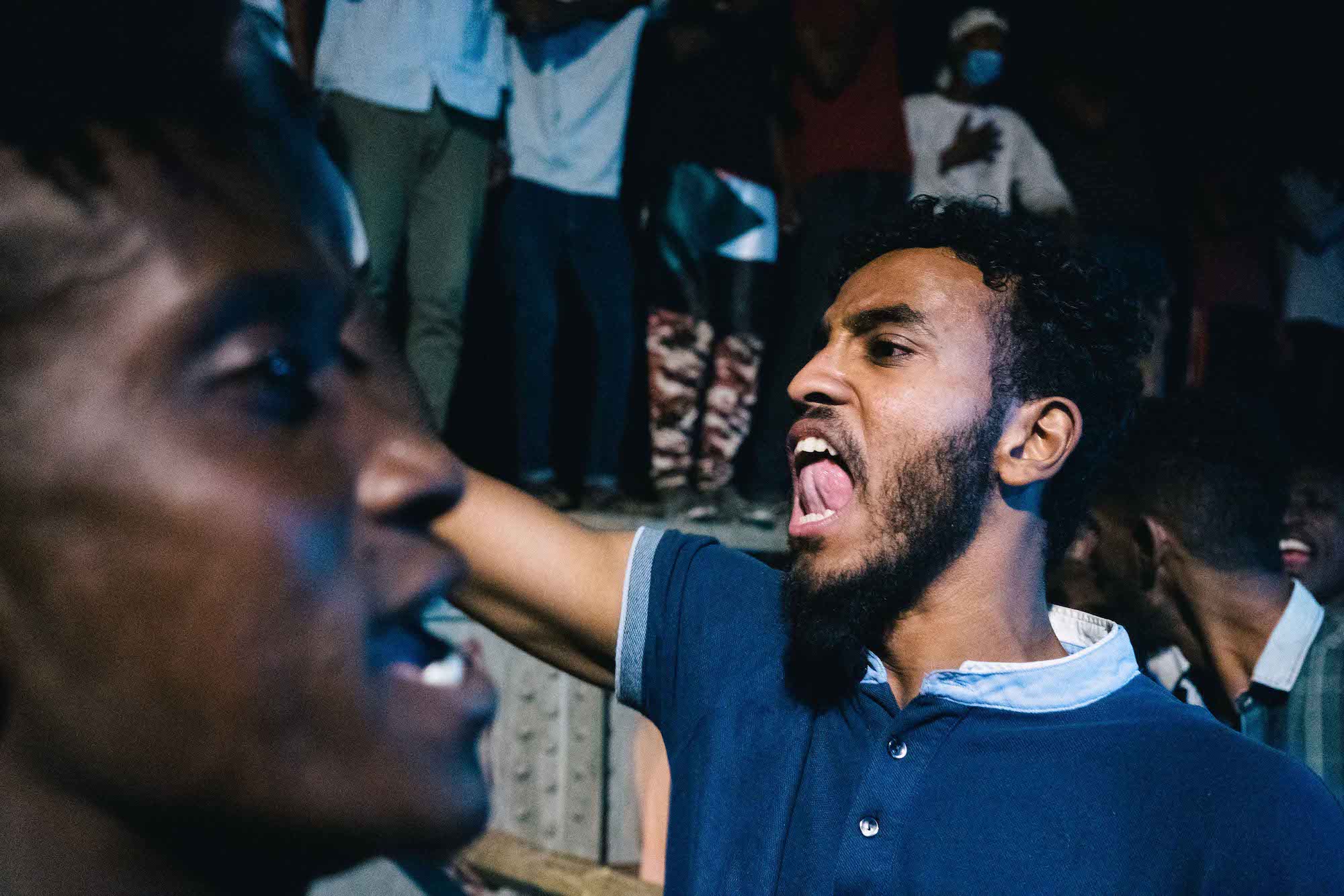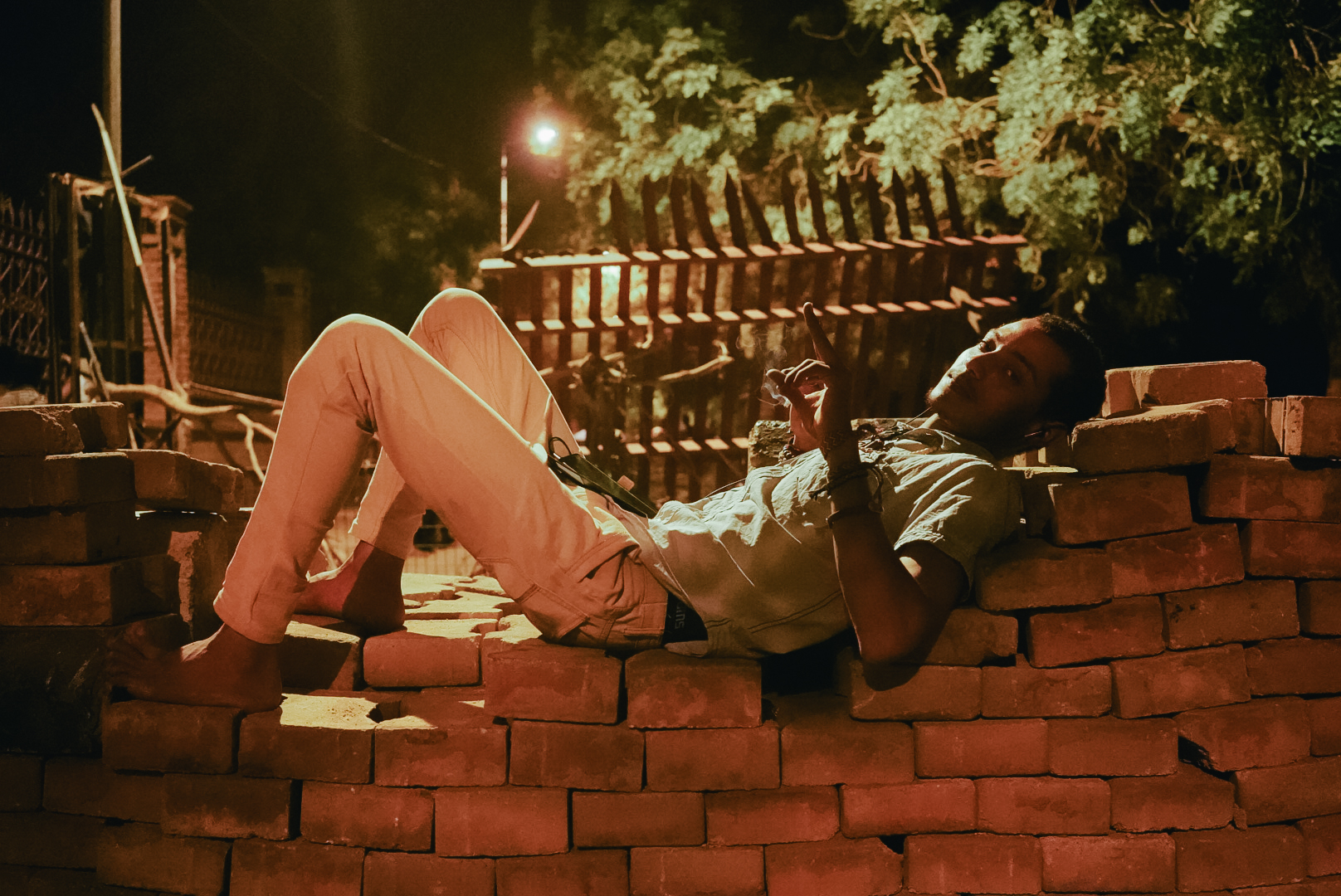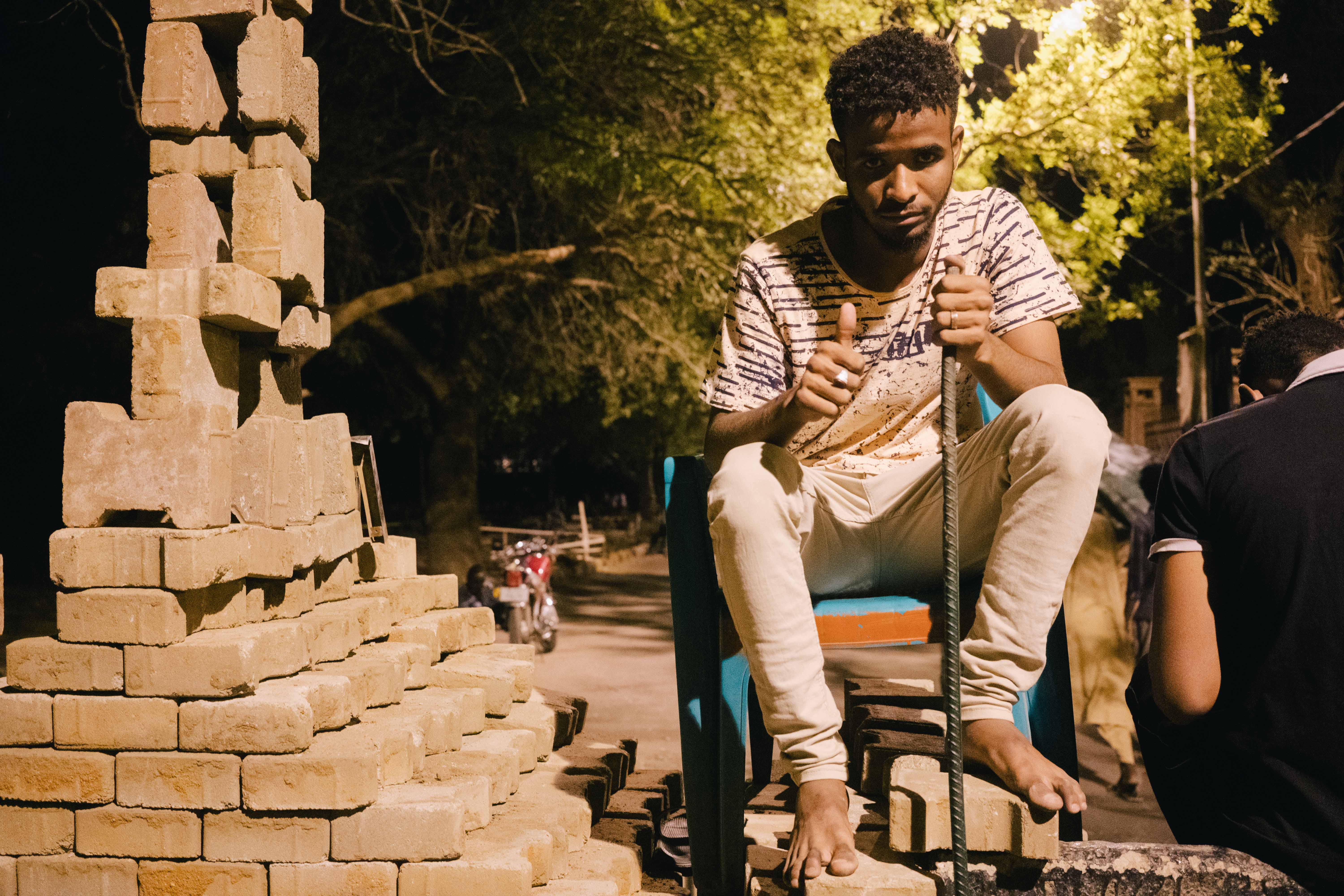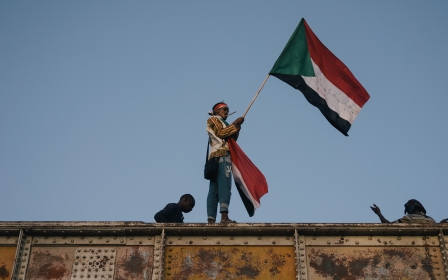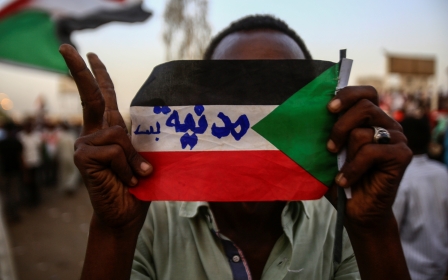Behind shifting barricades of bricks, Sudanese youth call for justice for 'martyrs'
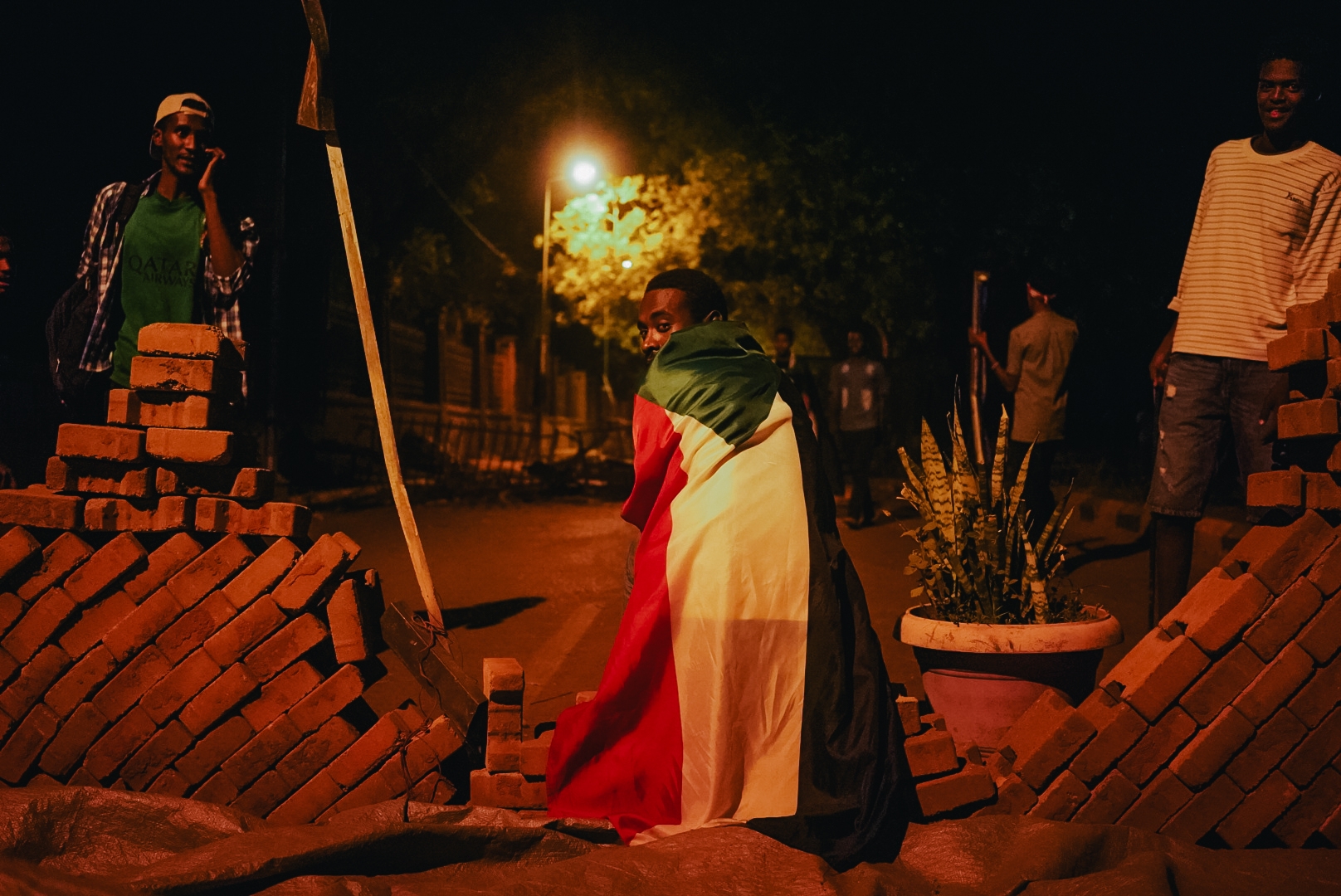
Facing down soldiers sat in machine-gun-mounted pick-up trucks on the southern bank of the Blue Nile, groups of Sudanese youth hammer relentlessly at scraps of metal, as if beating war drums.
Only brick barricades separate the two sides, built by protesters on an almost industrial scale to occupy Khartoum's Nile Street, by Tuesday pushing the frontline of the tussle for Sudan's future to within a few hundred metres of the presidential palace.
Their endeavour was fuelled by outrage after gunmen in the uniforms of the Rapid Security Forces (RSF) paramilitary suddenly opened fire on protesters on Monday, killing six and injuring 200 more.
The organic organisation of the unarmed youth, who chanted the word "peaceful" and raised their hands in the air moments before they were shot at by heavily armed forces, has seen them emerge as an independent and unpredictable force in the process of defining Sudan since former president Omar al-Bashir was removed from office in early April.
Until now, that process had mostly involved the Transitional Military Council (TMC), which seized power from Bashir, and the politically minded protest leaders negotiating with them.
New MEE newsletter: Jerusalem Dispatch
Sign up to get the latest insights and analysis on Israel-Palestine, alongside Turkey Unpacked and other MEE newsletters
Abdel Fattah al-Burhan, the military leader who replaced Bashir, acknowledged that when he announced on Wednesday night a 72-hour suspension of talks with the opposition, when Sudanese had actually been waiting for an agreement on the creation of a joint civilian and military government by the end of the day.
Burhan argued that the atmosphere was not conducive for such an agreement to be reached, demanding the barricades be removed and bemoaning public hostility towards the military.
Soldiers have repeatedly tried to remove barricades in central Khartoum only to see them repeatedly re-emerge within minutes, each time larger and more sophisticated. On Wednesday afternoon, the altercations over the barricades led the RSF to once again shoot on protesters.
'Justice for our martyrs'
On Nile Street, the military's ultimatums held little weight among youth, who accuse the country's powerful of lies and "half-truths".
Moussa Ossama, a 20-year-old civil engineering student lying along the top of a brick barricade, listening to music with a cigarette dangling from his mouth, told MEE he had no intention of moving.
"We haven't been given justice for our martyrs yet, so for now I am staying guard," he said.
Scores of protesters have been killed since the protests against Bashir began in December, and Ossama said justice and accountability for these cases was an important demand of the demonstrator movement, on a par with calls for a civilian government.
In the meantime, he insisted that the barricades remain because he did not trust the soldiers, who until Monday night's attack were stationed in their pick-up trucks on the edges of the sit-in.
"We have to stand against the RSF. Any street that leads to the sit-in has to be blocked," he said.
The barricades were originally set up as a security perimeter around the country's military headquarters, where protesters started a sit-in on 6 April that created the pressure to end Bashir's 30-year rule. The sit-in has remained in place as they demand that the TMC that ousted Bashir hand power to civilians.
After Burhan's announcement, most of the barricades did retreat back to those original positions around the sit-in, within borders the opposition Forces for Freedom And Change set to keep the peace. On Thursday night, the production lines of protesters building barricades were now dismantling them.
Not all demonstrators agreed with this new stance, however. Outside the University of Khartoum, a debate raged between a representative of the protest leaders and some of the volunteer guards who refused to move the remaining barricades.
The youth chose Nile Street as the site of the new barricades. The military has been desperate to open the road, as it is a key route between parts of the city and gives access to a number of major government buildings.
This area around the Blue Nile has also seen key battles in Sudan's history; in 1885, it was there that Sudanese Mahdist rebels killed the country's British administrator, Major-General Charles Gordon, and took control of Khartoum after besieging the city for almost a year.
The opposition, who thought it was close to reaching an agreement on a three-year transitional period that would have included a legislative council and a joint military and civilian governing council, has tried to mediate between the protesters and the military.
While it declared the TMC responsible for the violence against protesters and angrily rejected Burhan's announcement, it has also sent delegations to the barricades to convince the youth manning them to step back, on occasion by promising that, if need be, they could shut down the whole of Khartoum.
The majority of protesters still place their faith in the protest leaders who, led by the Sudanese Professionals Association, have organised the protest programmes that led to Bashir's removal and are now leading negotiations, but some of the youth are not convinced by the withdrawal tactic.
While the SPA represents mostly middle-class professionals, many of the Sudanese boys manning the barricades are young teens who are both out of school and out of work and place little trust in the military at all.
At an impromptu concert inside the sit-in, one youth stood up during an intermission to reject Burhan's demands.
"We will barricade the whole of Sudan," he said, to roars of approval.
Call for unity
Omar Khalid Youssef, secretary-general of the opposition Sudanese Congress Party and a leading member in the protest alliance, said they made an agreement with the military council to scale back the barricades in exchange for RSF's withdrawal from the streets.
"What we aim for is to organise ourselves, not to make too many individual actions that could give them excuses to kill us. Our unity has been the only path for success in the past and it must continue," he told MEE.
Our unity has been the only path for success in the past and it must continue
- Omar Youssef, secretary-general of the Sudanese Congress Party
The military council has denied it was involved in Monday's attack on the sit-in, and claims the RSF was not involved either. Protesters feel otherwise, hissing whenever they see soldiers from the group, which grew out of the Janjaweed militia accused of alleged genocide in the western Darfur region.
RSF leader Mohammed Hamdan Dagolo, known as Hemeti, is the only member of the military council not from the Sudanese army, yet his forces have been as present on Sudanese streets as any other during the protests.
On Friday, protesters again accused the RSF of trying to dismantle barricades, this time much closer to the sit-in, within the opposition's set boundaries.
Holding a metal pole as if it was a staff to guard his post with as he sat on a plastic chair placed upon a tmetre-high barricade, 19-year-old Khaled Omar said he was on Nile Street when the RSF attacked on Monday.
"I saw it all, someone shot in the head. Blood everywhere," Omar, a daily labourer, told MEE.
"My friends were hit. We were guarding the inside of the sit-in. Then we were attacked on this street, so now we guard here ... there was nothing here before and now, look how big it's become.
"The soldiers always come from this way, so we're sitting here. We're guarding this street."
Middle East Eye delivers independent and unrivalled coverage and analysis of the Middle East, North Africa and beyond. To learn more about republishing this content and the associated fees, please fill out this form. More about MEE can be found here.


